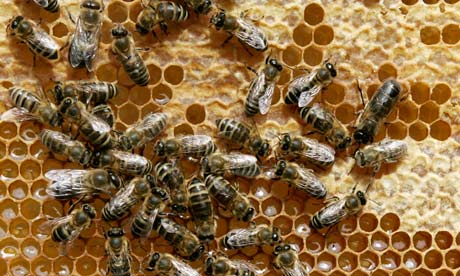EU Bans GM-Contaminated Honey from General Sale
Source -The Guardian, UK
Bavarian beekeepers forced to declare their honey as genetically modified because of contamination from nearby Monsanto crops.

Honey bees on a honeycomb in Germany. A European court has ruled that honey which contains traces of pollen from genetically modified crops needs special authorisation before it can be sold. Photograph: Heribert Proepper/AP
The European Union's highest court on Tuesday ruled that honey which contains trace amounts of pollen from genetically modified (GM) corn must be labelled as GM produce and undergo full safety authorisation before it can be sold as food.
In what green groups are calling a "groundbreaking" ruling, the decision could force the EU to strengthen its already near-zero tolerance policy on genetically modified organisms (GMOs).
Bavarian beekeepers, some 500m from a test field for a modified maize crop developed by Monsanto - one of only two GM crops authorised as safe to be cultivated in Europe - claimed their honey had been "contaminated" by pollen from the plant.
The European court of justice found in their favour, a ruling that should offer grounds for the beekeepers to claim compensation in a German court.
But the court's finding also potentially threatens recent EU legislation, introduced in July this year, that permits traces of GMOs in animal feed without a safety review.
Mute Schimpf, food campaigner for Friends of the Earth Europe, said that the ruling "would confirm that existing laws allowing traces of unauthorised GM contamination are insufficient and would need revising."
French Green MEP José Bové, an ex-farmer well-known for his destruction of a McDonald's franchise in the south of France and the uprooting of GM crops in Brazil, said that the only protection farmers can have is for a complete ban on GMOs in Europe. "Beekeepers are powerless to prevent the contamination of their honey by GM pollen, as farmers are for their crops, and thus powerless to prevent the tainting of the foodstuffs they produce and the integrity of their product.
"The only sure way to prevent this is by precluding the cultivation of GMOs."
Greenpeace, describing the traces of pollen in the honey as "genetic pollution" said that Monsanto and the Bavarian state should be held liable for the beekeepers' losses as a result of their product having to be labelled as containing GMOs.
However, agricultural specialists criticised the ruling, saying that the decision has no grounding in science.
Guy Poppy, the director of the centre for biological sciences at the University of Southampton, told the Guardian: "There is no safety issue. This honey is as safe as any other."
The corn in question is genetically engineered to produce an insecticide that naturally occurs in the soil bacterium Bacillus thuringiensis (BT). The production of this toxin protects the maize plants from European corn borer larvae.
"The Monsanto maize is genetically modified to produce the BT protein. But this same protein actually has been regularly used for years as a spray even by organic farmers," he added.
"The consequences of these sorts of ruling is that new methods of plant breeding, whether GM or other forms that are developed, could be thrown out of potential use, making it impossible to innovate."
Vivian Moses, professor of biotechnology at the University of London and the chairwoman of Cropgen, an advisory group on GM foods, said: "These beekeepers believe that there is a sensitivity among consumers of the presence of GM material, that the honey containing GM loses quality. They are just protecting their economic interest.
"But scientifically this doesn't add up to anything, as the crop has been judged as safe for human consumption."
In response to the ruling, the European commission will in two weeks discuss the issue of GMOs and honey with EU member states.
According to Brussels, it is likely that the decision will have an impact on the honey into the EU as Europe does not itself produce sufficient quantities for the size of the market. The bloc produces 200,000 tonnes per year and must import an additional 140,000 tonnes.
Argentina and China, both GM-friendly countries and the two biggest importers of honey into the EU, are likely to be affected in particular, the commission warned.
"The honey is not dangerous. There is no health risk from honey in the EU," insisted EU consumer protection spokesman, Frédéric Vincent, worried that shoppers might stop buying honey as a result of the news.
"It's an important ruling from the court. I can't say at this point whether we need to change any laws," he added. "The contamination is done by the bees themselves. We can't put GPS tracking on the bees."
|







